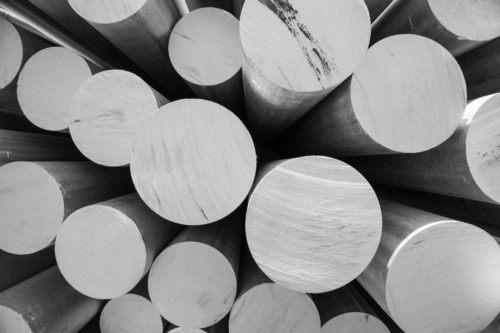The Ultimate Guide To Stahl Specialty Company
Wiki Article
About Stahl Specialty Company
Table of ContentsThe Best Guide To Stahl Specialty Company3 Simple Techniques For Stahl Specialty CompanyStahl Specialty Company for DummiesThe Only Guide to Stahl Specialty CompanyThe 7-Second Trick For Stahl Specialty Company
The subtle difference hinges on the chemical material. Chemical Comparison of Cast Aluminum Alloys Silicon promotes castability by minimizing the alloy's melting temperature level and enhancing fluidity during spreading. It plays an essential duty in permitting elaborate molds to be filled properly. In addition, silicon contributes to the alloy's toughness and put on resistance, making it useful in applications where resilience is critical, such as auto components and engine components.It likewise enhances the machinability of the alloy, making it much easier to refine into finished items. In this means, iron adds to the overall workability of light weight aluminum alloys.
Manganese contributes to the stamina of light weight aluminum alloys and boosts workability. It is typically made use of in wrought light weight aluminum items like sheets, extrusions, and accounts. The existence of manganese help in the alloy's formability and resistance to fracturing throughout manufacture procedures. Magnesium is a lightweight component that offers stamina and effect resistance to light weight aluminum alloys.
Zinc boosts the castability of aluminum alloys and helps control the solidification procedure throughout spreading. It enhances the alloy's toughness and solidity.
The Definitive Guide for Stahl Specialty Company
Because aluminum-silicon alloys have great spreading residential or commercial properties, high gas buildings, simple procedures, and superb corrosion resistance, aluminum-silicon alloys are most commonly made use of in the die-casting sector in your home and abroad. At the same time, aluminum-silicon alloys are likewise relatively very early and widely identified alloys established and utilized in die-casting. After continuous research study and improvement, a lot of the present international mainstream aluminum-silicon alloys have been finalized and are nothing greater than A356, A360, A380, ADC12, B390, and A413.
The key thermal conductivity, tensile strength, return toughness, and elongation differ. Select suitable basic materials according to the efficiency of the target product created. Among the above alloys, A356 has the highest possible thermal conductivity, and A380 and ADC12 have the least expensive. The tensile limit is the contrary. A360 has the best yield stamina and the greatest prolongation rate.

The Basic Principles Of Stahl Specialty Company
In precision spreading, 6063 is well-suited for applications where complex geometries and premium surface area coatings are critical. Examples consist of telecommunication units, where the alloy's premium formability enables streamlined and aesthetically pleasing styles while maintaining structural stability. In the Lighting Solutions my review here market, precision-cast 6063 parts create sophisticated and reliable lights components that need detailed forms and excellent thermal efficiency.
(https://zenwriting.net/stahlspecialc/stahl-specialty-company-is-one-of-the-largest-permanent-mold-foundries-in-the-us)
It leads to a better surface area coating and far better corrosion resistance in A360. The A360 shows remarkable prolongation, making it perfect for complicated and thin-walled parts. In accuracy spreading applications, A360 is well-suited for industries such as Consumer Electronics, Telecommunication, and Power Devices. Aluminum Casting. Its improved fluidity permits for intricate, high-precision parts like mobile phone housings and communication device real estates.

In accuracy casting, aluminum 413 shines in the Consumer Electronics and Power Devices industries. This alloy's superior deterioration resistance makes it an exceptional option for exterior applications, making sure durable, resilient items in the discussed sectors.
All About Stahl Specialty Company
As soon as you have actually decided that the light weight aluminum pass away casting procedure appropriates for your project, a critical following action is picking one of the most ideal alloy. The light weight aluminum alloy you select will significantly influence both the spreading procedure and the properties of the final item. Due to the fact that of this, you must make your choice carefully and take an informed method.Identifying the most suitable light weight aluminum alloy for your application will certainly mean weighing a broad array of characteristics. These relative alloy characteristics follow the North American Pass Away Casting Association's guidelines, and we've separated them right into two groups. aluminum foundry. The first category addresses alloy features that impact the manufacturing process. The 2nd covers attributes impacting the homes of the final product.
The alloy you choose for die spreading directly impacts several aspects of the casting procedure, like how very easy the alloy is to work with and if it is prone to casting flaws. Hot fracturing, also called solidification breaking, is a typical die spreading issue for light weight aluminum alloys that can cause interior or surface-level tears or fractures.
5 Easy Facts About Stahl Specialty Company Shown
Particular light weight aluminum alloys are much more at risk to hot breaking than others, and your selection should consider this. An additional common flaw found in the die casting of light weight aluminum is die soldering, which is when the cast adheres to the die wall surfaces and makes ejection challenging. It can damage both the cast and the die, so you ought to search for alloys with high anti-soldering residential properties.Corrosion resistance, which is currently a notable feature of light weight aluminum, can vary considerably from alloy to alloy and is a vital characteristic to consider depending upon the environmental problems your item will certainly be subjected to. Wear resistance is an additional residential or commercial property typically looked for in light weight aluminum products and can distinguish some alloys.
Report this wiki page